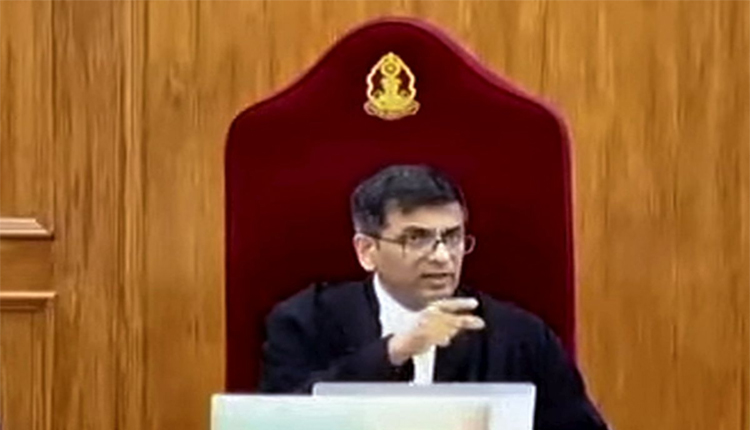Bengaluru: Supreme Court Chief Justice DY Chandrachud has strongly condemned a recent incident involving a Karnataka High Court judge whose remarks referring to a community-associated location as “Pakistan” went viral. Addressing the matter in a courtroom setting, Chandrachud emphasized the importance of responsible speech, especially for individuals in positions of authority.
The controversy arose when Karnataka High Court Judge Sreeshanand made inappropriate comments about a specific area, associating it with Pakistan. The incident quickly garnered widespread attention on social media, prompting public outrage. In response, the Chief Justice underscored that no part of India can be equated with Pakistan, highlighting the sensitivity required when discussing community-related issues.
During the hearing, Chandrachud stressed that individuals holding responsible positions must be cautious with their words to uphold the dignity of all communities. He particularly pointed out that judges have a heightened responsibility to maintain impartiality and avoid biased statements.
The case was initiated based on a report from the Registrar General of the High Court, which noted that Judge Sreeshanand had tendered an unconditional apology for his remarks. When questioned, Attorney General R Venkataramani acknowledged the incident and expressed concerns about potential internal actions. Solicitor General Tushar Mehta added that while public figures may sometimes make offhand comments, the situation should not be exaggerated.
Chief Justice Chandrachud also addressed the broader implications of the incident, noting the extensive reach of live-streamed court proceedings. He highlighted that the visibility of courtroom interactions on social media platforms places additional responsibility on lawyers, judges, and litigants to conduct themselves appropriately, as their actions can have far-reaching impacts.
“In today’s digital age, the audience behind court live-streaming has significant reach. This places an onus on all participants in the court to maintain decorum and avoid casual conduct that can be misconstrued or have unintended consequences,” Chandrachud remarked.
He further elaborated on the influence of social media, stating, “You cannot call an area of this country Pakistan, nor can social media be controlled. The anonymity associated with social media makes it a very dangerous tool.”
Chandrachud concluded by advocating for transparency and openness, asserting that the solution to misinformation and prejudice is more sunlight, not restrictions. He reaffirmed that live-streaming court proceedings should continue, allowing for greater accountability and public trust in the judicial system.
As the hearing concluded, Chief Justice Chandrachud acknowledged the apology from Judge Sreeshanand and declared the case closed, emphasizing the need for continuous vigilance in maintaining the integrity and dignity of the judiciary.



Comments are closed.